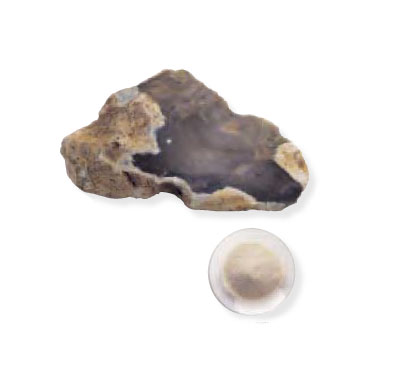Silica
Silicea terra syn. Acidum silicicum
Origin
Hahnemann prepared Silica from mountain crystal; homeopaths later made it from flint. Chemically prepared silicon dioxide (silica sand) is now used.
Background
Used as silica sand in industry in the making of cement and concrete, as well as ceramics and glass. It is also used to grind and polish glass and stone.
Preparation
Made by triturating silicon dioxide, grinding the sand repeatedly with lactose sugar until it becomes soluble in water, then diluting and succussing it.
Common Names
Silica, flint, quartz, rock crystal.
Hahnemann prepared Silica from mountain crystal; homeopaths later made it from flint. Chemically prepared silicon dioxide (silica sand) is now used.
Background
Used as silica sand in industry in the making of cement and concrete, as well as ceramics and glass. It is also used to grind and polish glass and stone.
Preparation
Made by triturating silicon dioxide, grinding the sand repeatedly with lactose sugar until it becomes soluble in water, then diluting and succussing it.
Common Names
Silica, flint, quartz, rock crystal.

SILICA
A principal constituent of sandstone and other rocks, silica is found in many forms, from colorless rock crystal to stonelike flint and semiprecious stones such as opal.
Key Symptoms
lack of assertiveness and stubbornness; lack of stamina; chilliness, but with offensive-smelling perspiration; susceptibility to recurrent infections- Silica is a form of the nonmetallic element silicon, which is one of the major elements of Earth's crust and a vital constituent in the structure of plants. In the human body, it strengthens teeth, hair, and nails and is also found in connective tissue. Silica, proved by Hahnemann in 1828 and given more for slow-developing conditions than for acute ailments, has the unusual feature of reputedly being able to help expel foreign bodies such as splinters from the skin.
Remedy Profile
People who respond best to Silica typically lack mental and physical stamina. Their overconscientious attitude to work can often lead to exhaustion or insomnia. They may feel anxious and "in two minds" about things, and fear pointed objects, such as needles. Their outlook and aspirations are limited by fear of failure. Very shy as children, they are selfconscious and unassertive as adults, but can be extremely stubborn and may relieve their frustrations on subordinates.Chilliness is a typical physical symptom, along with a marked tendency for profuse, smelly sweat. Digestive problems and a weakened bone structure, due to poor absorption of food and undernourishment, may occur, along with recurrent infections caused by a weak immune system. Skin and bone problems are slow to heal and any wounds tend to suppurate.
Many symptoms appear at an early age: the fontanelles (membrane-covered spaces between the bones of a baby's skull) close slowly, for instance, and the bones and teeth form more slowly and are weaker than those of other children.
Skin, teeth, nail & bone conditions
Symptoms: Slow eruption of teeth, wisdom teeth problems, and defects in skin, hair, and nails, due to poor absorption of minerals in the diet. Brittle, distorted, infected nails and ingrown toenails are also common symptoms. Wounds, even scratches, suppurate and heal slowly; abscesses may form anywhere, including in the roots of teeth. There may be itchy scars or keloids after larger wounds, persistent acne, and copious, smelly sweating. Backaches are common; brittle, poor-quality bones are slow to mend if broken; and there may be curvature of the spine.Symptoms better: In summer; for lying down; for being well wrapped up.
Symptoms worse: For cold and damp; when menstruating; for pressure on the painful area.
Ear, nose & throat conditions
Symptoms: Recurrent colds, swollen glands, ear infections, and tonsillitis leading to quinsy (abscess on the tonsil). Chronic catarrh may cause sinusitis, and glue ear (fluid in the middle ear) may cause earaches and hearing problems.Symptoms better: For lying down; for being well wrapped up; for warm drinks.
Symptoms worse: For cold and damp; for drafts; for suppressing perspiration.
Coughs
Symptoms: A persistent, dry, irritating cough that takes the form of severe, exhausting coughing bouts. Inflammatory conditions such as bronchitis may be accompanied by foul-smelling sputum.Symptoms better: For being well wrapped up; for lying down; for warm drinks.
Symptoms worse: For cold and damp; for drafts; for suppressing perspiration.
Digestive disorders
Symptoms: A weak digestive system, with intolerance of particular foods, especially fat and milk; in babies this may even include mother's milk. There may be poor absorption of essential minerals into the body, and a preference for cold foods. Symptoms may include constipation, with an inability to expel stools so that they slip back into the rectum, which may develop painful cracks (fissures) or abscesses. Painful abdominal cramps and smelly flatulence are other symptoms.Symptoms better: In summer; for being well wrapped up.
Symptoms worse: For cold and damp; at a new moon; for suppressing perspiration.
Headaches
Symptoms: Severe pain, starting at the back of the head and extending over to the forehead, with dizziness and visual disturbance.Symptoms better: For warmth; for closed eyes; for dark, quiet rooms; for wrapping the head.
Symptoms worse: For cold; for light; for noise.
© 2025 KnowHomeopathy | All rights reserved